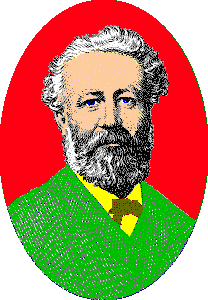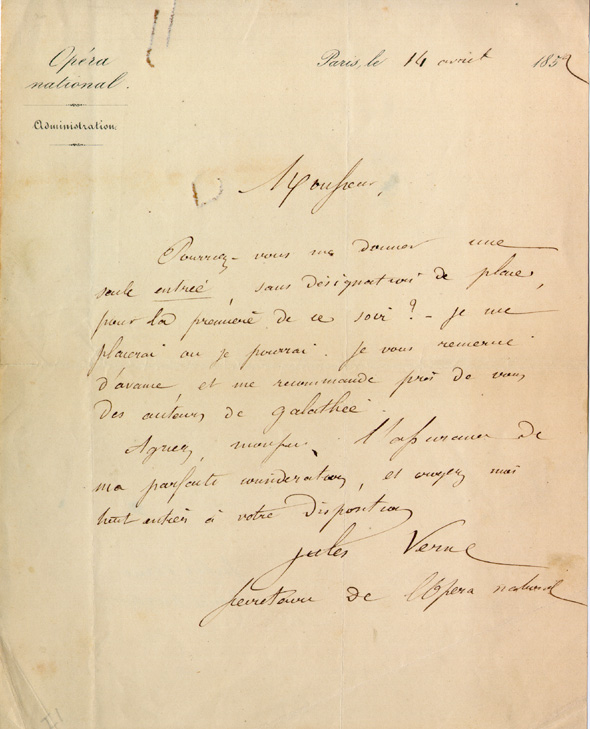| Notes: |
When purchased this was represented as having the date 1857.
HERE is the case for
1) dating the letter 1852
2) that Verne was asking for a ticket to the opera Galathée
AND 3) the ticket was to be for Verne himself.
1)The case for a date of 1852
The date could be read as 1852 or 1857 or 1859 because of the vagueness of the writing
Information associated with the letter stated its date was 1857.
THE LETTER: it is written on Opera letterhead, and the letter is signed by Verne in his capacity as the Secretary.
FACT: Jules Verne worked for the Théâtre Lyrique also called the Opera (the third of the 3 main opera houses in Paris) from 1852 to 1854.
He was no longer working for the Opera in 1857 or for that matter 1859.
( from a Verne timeline- "1852: Jules Verne est secrétaire du Théâtre Lyrique qu'il quittera en 1854")
CONCLUSION: date of letter is 1852 because
Verne was the Secretary at the time
Note: There is evidence that Verne has used Opera stationary after his tenure, as shown in "L'Herne" page xx, in a letter to his father. For that letter Verne may have been using a left-over supply of stationary, since he was a "poor starving playwright", BUT since this letter is signed "Secretaire", the evidence points to 1852.
2)The case for the opera Galathée being the play for which the ticket was requested.
THE LETTER:
- Verne states it is the premiere of the opera
- Verne states the ticket is for "this evening"
- is dated April 14, 1852 (see conclusion above)
CONCLUSION: the production must be premiering on April 14, 1852
3)The case for Verne requesting a ticket for himself
FACT: The Opera Galathée premiered
on April 14, 1852 at the Opéra Comique.
THE LETTER: As a recomendation, Verne indicates that he knows the authors of Galathée.
This recomendation, would not make sense for another Opera, since
no one would know the authors of Galathée since it hadn't opened yet.
(i.e. I want to go to see play "B" and to be helpful I say I know the authors of play "A". But if play "A" hasn't opened yet, how would that be a recomendation for getting tickets to play "B"!)
CONCLUSION: the recomendation of knowing the authors of Galathée, is because he wants a ticket to see the Opera Galathée.
FACT: Galathée is an opera comique
en 2 actes, paroles de Jules Barbier et Michel Carre and musique de Victor
Masse; partition piano & chant
Knowing the authors of Galathée, means Verne knows at least
one of Jules Barbier, Michel Carre or Victor Masse.
FACT: Jules Verne wrote Monna Lisa a
Comedy in one act in verses, in 1852 with Michel Carre
CONCLUSION: it was Michel Carre that Verne knew, and who is used as a "recomendation in the letter.
CONCLUSION: Jules Verne was asking for 1 ticket for himself, to go to see the Opera Galathée which was written by his friend Michel Carre, which was premiering April 14, 1852.
Aditional information:
Michel Carre (1819- 1872).
Victor Masse (1822 - 1884):
Compositeur français, né à Lorient
le 7 mars 1822, et mort à Paris le 5 juillet 1884.
Il fut l'élève de Zimmerman et d'Halévy au
Conservatoire de Paris, et devint Prix de Rome en 1844.
Chef des choeurs de l'Opéra en 1860, il fut professeur de
composition au Conservatoire de Paris de 1866 à 1880, et succéda
à Auber à l'Institut en 1872.
Il réussit au théâtre de bonne heure et écrivit
une vingtaine d'oeuvres lyriques, opéras, opéras comiques
et opérettes :
- Les Noces de Jeannette, opérette en un acte (1853), charmante
bluette rustique, encore beaucoup jouée sur les scènes françaises,
- La Chanteuse voilée (1850), avec laquelle il débuta
à l'Opéra Comique est de la même veine
- La Chambre Gothique (représentée à Paris
aux Folies Dramatiques en 1849),
- La Fiancée du Diable, en trois actes (1854),
- Fior d'Aliza (1866)
- Il se penche également sur des sujets plus ambitieux, comme:
- Galathée (1852), oeuvre donnée environ cinq cents
fois à l'Opéra Comique,
- La Reine Topaze (1856),
- Paul et Virginie (1872),
- Une Nuit de Cléopatre (1885)
Il écrivit aussi des opérettes de famille qui, assure-t-on,
sont des merveilles de brio et de légèreté, dont
Premiere of Galathée was on April 14, 1852
see http://www.intac.com/~rfrone/operas/sfo/Dates/sfo-dat3.htm
I'd love to find out if Verne got his ticket! and if he went. Did
seeing it influence his plays or books.
Last point, an open question:
Since Verne is asking for a ticket for "tonight", how were letters
delivered in 1852?
Did Verne hand it to someone, and they walked it over to l'Opéra
Comique?
Did Verne walk it over himself and hand it to the box office of
l'Opéra Comique?
FACT: May 1852 is the date on which the Verne
story, Un voyage en ballon, was first published in English.
{ FACT: April 14, 1912 is the date that RMS Titanic hit the iceberg and subsequently sank. This occurs 60 years after Verne wrote this letter.} |






